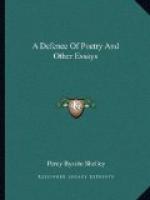only man with man, but with everything which exists.
We are born into the world, and there is something
within us which, from the instant that we live, more
and more thirsts after its likeness. It is probably
in correspondence with this law that the infant drains
milk from the bosom of its mother; this propensity
develops itself with the development of our nature.
We dimly see within our intellectual nature a miniature
as it were of our entire self, yet deprived of all
that we condemn or despise, the ideal prototype of
everything excellent or lovely that we are capable
of conceiving as belonging to the nature of man.
Not only the portrait of our external being, but an
assemblage of the minutest particles of which our
nature is composed;[Footnote: These words are
ineffectual and metaphorical. Most words are so—No
help!] a mirror whose surface reflects only the forms
of purity and brightness; a soul within our soul that
describes a circle around its proper paradise, which
pain, and sorrow, and evil dare not overleap.
To this we eagerly refer all sensations, thirsting
that they should resemble or correspond with it.
The discovery of its antitype; the meeting with an
understanding capable of clearly estimating our own;
an imagination which should enter into and seize upon
the subtle and delicate peculiarities which we have
delighted to cherish and unfold in secret; with a
frame whose nerves, like the chords of two exquisite
lyres, strung to the accompaniment of one delightful
voice, vibrate with the vibrations of our own; and
of a combination of all these in such proportion as
the type within demands; this is the invisible and
unattainable point to which Love tends; and to attain
which, it urges forth the powers of man to arrest the
faintest shadow of that, without the possession of
which there is no rest nor respite to the heart over
which it rules. Hence in solitude, or in that
deserted state when we are surrounded by human beings,
and yet they sympathize not with us, we love the flowers,
the grass, and the waters, and the sky. In the
motion of the very leaves of spring, in the blue air,
there is then found a secret correspondence with our
heart. There is eloquence in the tongueless wind,
and a melody in the flowing brooks and the rustling
of the reeds beside them, which by their inconceivable
relation to something within the soul, awaken the
spirits to a dance of breathless rapture, and bring
tears of mysterious tenderness to the eyes, like the
enthusiasm of patriotic success, or the voice of one
beloved singing to you alone. Sterne says that,
if he were in a desert, he would love some cypress.
So soon as this want or power is dead, man becomes
the living sepulchre of himself, and what yet survives
is the mere husk of what once he was.
[1815; publ. 1840]




